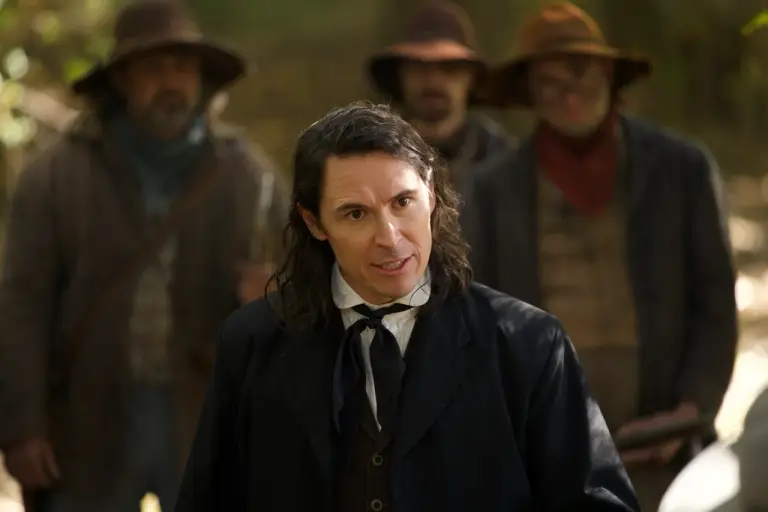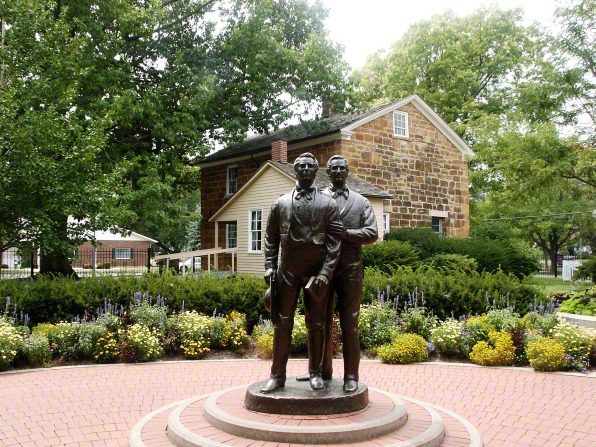
My wife and I were back in Nauvoo and Carthage, Illinois, a few weeks ago. We were there for several days of work on the series of mini-documentaries that the Interpreter Foundation is producing under the title of Becoming Brigham. Every time I visit the area, I find myself thinking about the remarkable way in which the history of that part of Illinois has unfolded.
Thomas Sharp and his conspirators down in Warsaw, to the south of Nauvoo, and the mob that did the deed in Carthage to the east, thought that, by murdering Joseph and Hyrum Smith, they had put an end to “Mormonism.”
Now, though, Thomas Sharp and his cronies are pretty much completely forgotten — except as evil footnotes in the history of the Church of Jesus Christ of Latter-day Saints. Virtually nobody visits Warsaw unless (as I did on a couple of occasions some years ago) it is as a side trip from the Latter-day Saint temple that has been rebuilt in Nauvoo and the visitors center and historic sites that surround it, to see the place where Sharp and his co-conspirators hatched their homicidal plot. For many years (including my first visits), it was in ruins. Now, though, Thomas Sharp’s place has been beautifully restored: An active Latter-day Saint lady, a returned senior missionary, owns it and lives in it.

(Wikimedia Commons public domain photo)
And the only thing of any real interest in the dusty, sleepy, nondescript little town of Carthage — “the town that time forgot,” as I’m inclined to call it — is the jail in which Joseph and Hyrum were martyred. Attractively landscaped, meticulously maintained, adorned with statues of the martyred prophet and patriarch, it’s become something of a place of pilgrimage. Every year, thousands and thousands of visitors come from across the United States and beyond to pay their respects to the two men whose lives were unjustly taken there, to contemplate yet one more time the appalling and solemn events that occurred on 27 June 1844.
To their enormous discredit, some detractors of the Restoration have vainly sought to defend the perpetrators of that quasi-official frontier assassination or, at least, to minimize the guilt that they bear and, instead, to attempt to blame the victims.
I quote from an item that I wrote quite a few years ago in response to some materials produced by the Southern Baptist Convention:
In the view of Rev. Wright, who is an ordained minister in the Southern Baptist Convention, not even the murder of Joseph Smith was undeserved. He goes further, in this regard, than did the experts at the SBC’s Denominational Summit on Mormonism, which was held in North Carolina on the one hundred and fifty-third anniversary of the Prophet’s death. “Smith was killed while escaping jail,” they said, untruthfully. Responding to some remarks made by President Gordon B. Hinckley, Pastor Wright notes that
the deaths of Joseph and Hyrum on June 27, 1844, didn’t occur until after Joseph had fired upon the so-called “mob” with a pistol that had been secreted to him while in jail and had killed one man and injured several others.
“Rage and persecution” may have followed the Mormons to Illinois, but the Saints of that day brought most of it upon themselves!
Rev. Wright is wrong about Hyrum’s death, which occurred immediately prior to Joseph’s drawing the pistol. But he is almost certainly correct in his claim that Joseph’s firing of the pistol took place while Joseph was still alive. His description of the events at Carthage represents an important and novel historical reconstruction, and it is vital that we understand it with precision. Apparently, Rev. Wright feels that Joseph Smith was obliged—though he was unjustly imprisoned and had not yet been tried, let alone convicted of anything, much less convicted of a capital offense, to allow “the so-called ‘mob'” to butcher not only himself and his brother Hyrum but his two friends, Willard Richards and John Taylor, whose only crime was that they had come to visit the prisoners. (John Taylor was, in fact, severely wounded by “the so-called ‘mob.'”)
Rev. Wright’s revised version of the events in Carthage seems to run along the following lines: The wily criminal lunatic Joseph Smith, who had remained quiet throughout his captivity, deliberately chose the very time when the peace-loving Carthage Greys—fully armed and with traditional blackened faces—were innocently gathered about the jail for their annual June 27th Militia Picnic. Frolicking with their weapons and calling out the death threats that customarily accompanied that grand holiday in frontier Illinois—it was a simpler time, and June 27th had not yet been commercialized—the proto-Gandhian Greys had merely been playing the venerable party game known among these gentle rustics as “Eat Hot Lead, Mormon Scum!” Then, wholly without provocation, Joseph Smith opened fire on the revelers, using the “pepperbox” pistol that Cyrus Wheelock had smuggled into his cell. Naïve historians, both Latter-day Saints and others, have always assumed that Joseph’s action had something to do with the fact that his brother Hyrum had just been shot to death. (Presumably, Hyrum was killed by a stray bullet from a local hunter, or perhaps from an evil Mormon assassin.) Rev. Wright, however, cannot be taken in by such sophistries. When Joseph continued to shoot at them as they mounted the jail’s interior staircase bearing a peace offering of cookies and punch, they had no choice. They killed him and his (already dead) brother in self-defense. It is true that they also shot John Taylor at least four times. But then, he had been very naughty to them with his cane, and needed to be taught a lesson.
By the way, I’m not at all certain that Joseph Smith “killed one man and injured several others” at Carthage Jail. But it wouldn’t upset me very much to learn that he did. They weren’t exactly innocent and blameless. And there is nothing morally wrong with self-defense, to say nothing of defending one’s friends and one’s brother.













